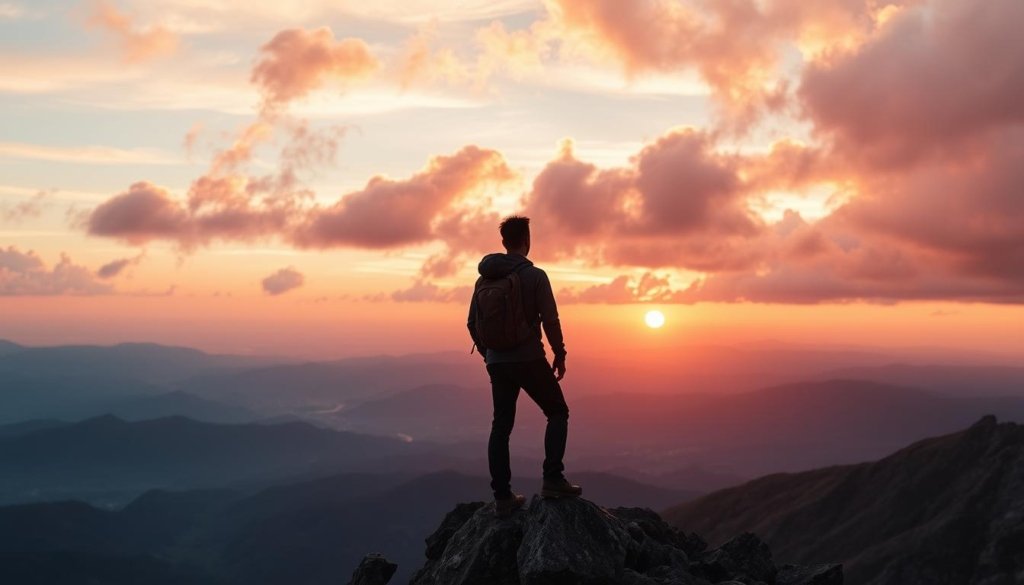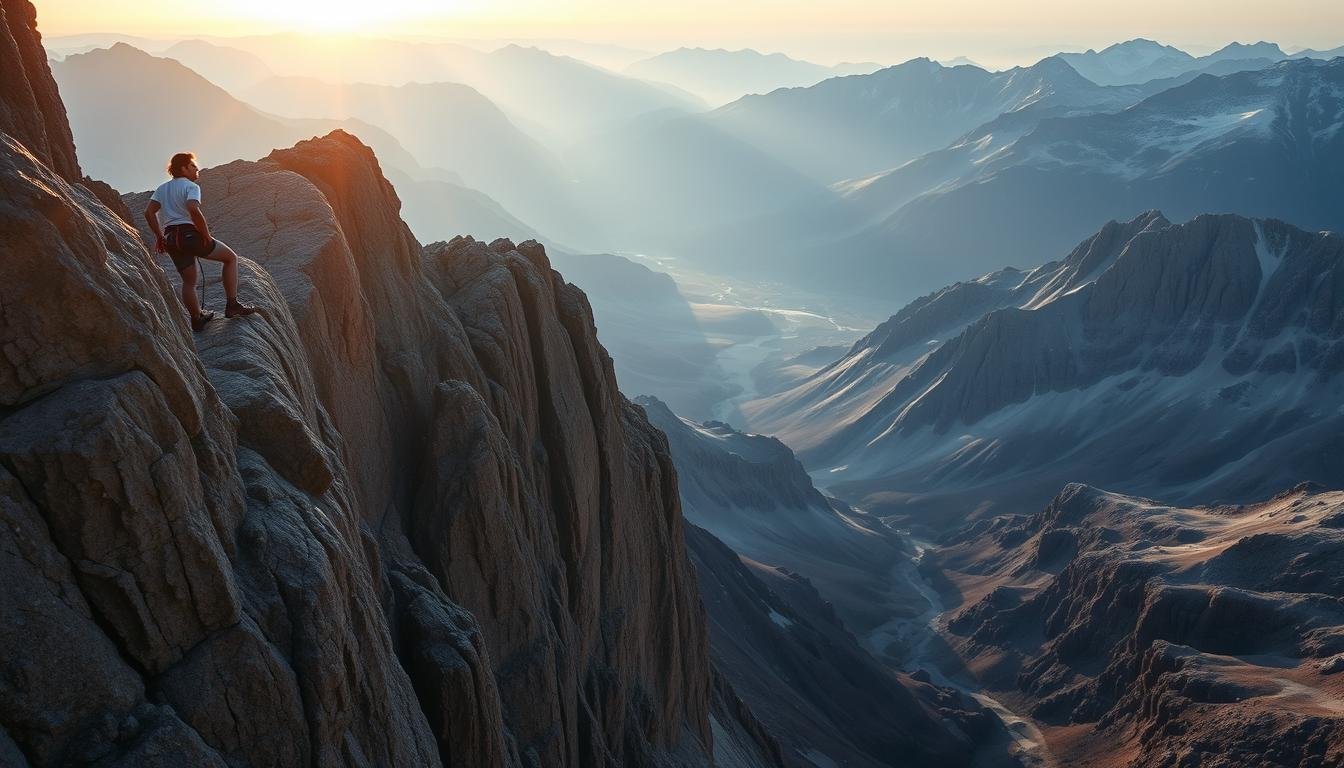Climbing is more than just a physical challenge; it’s a mental adventure too. Whether you’re tackling cliffs or indoor walls, you need strength, sharp thinking, and emotional strength. The mind’s role in climbing is key to doing well and staying safe. This piece looks into the mental side of climbing, showing how climbers face psychological and emotional challenges as they reach new peaks.
Key Takeaways
- Climbing needs both physical and mental readiness to face challenges.
- Using techniques like visualization and deep breathing helps build mental strength.
- Good problem-solving, emotional control, and strategic thinking are vital for climbing success.
- Setting goals and overcoming hurdles boosts a climber’s confidence.
- Practices like yoga and meditation improve focus, concentration, and mental clarity in climbing.
The Mind-Body Connection in Climbing
Climbing is a sport that blends physical strength with mental toughness. It’s all about how well the mind and body work together. Every move and decision on the wall shows how the climber feels inside1.
Concentration and Focus
Staying focused is key in climbing. Distractions can lead to mistakes that are risky. Climbers must quiet their minds to focus on the task. This means reading the route, finding the next step, or making precise moves1.
Visualization and Route-Reading
Good climbers use visualization and route-reading to get ready for the wall. They imagine the moves and what lies ahead. This helps them plan and understand the route better, improving their performance1.
Problem-Solving Skills
Climbing routes have tricky puzzles that need great problem-solving skills. Climbers must look at each challenge, think of solutions, and decide fast. This quick thinking is key in climbing1.
Emotional Resilience
Successful climbers are emotionally strong. They handle fear, frustration, and doubt while staying calm. Learning to control emotions and stay focused is crucial for climbing success1.
| Climbing Attribute | Percentage Influence on Success |
|---|---|
| Mental Strength | 80-90% |
| Physical Strength | 10-20% |
The table shows mental strength is key in climbing, making up 80-90% of success1. Climbers with strong mental skills, like visualization and emotional control, do better and reach their goals1.
“Mental strength is more important than physical strength in climbing. A climber with strong mental skills can often outperform a climber with superior physical abilities.”1 – Paul Robertson, a climber who completed a 5.13 route
The mind-body connection in climbing is complex and important. Mental skills play a big part in success. By improving their mental abilities, climbers can reach their full potential and achieve great things.
Fear and Risk Management
Fear is a big part of climbing, whether it’s the fear of falling or failing. Managing this fear is key to climbing higher and pushing limits. The first step is to accept and acknowledge fear, which lessens its power and keeps climbers focused.
Acceptance and Acknowledgment
Climbers with over 14 years of experience often lead trips for friends2. Yet, some, like a friend of a friend, let fear hold them back2. Acknowledging and accepting fear helps overcome it.
Breathing Techniques
Controlled breathing helps manage fear and anxiety. Focusing on breath grounds climbers, reduces stress, and keeps their minds clear. Adding breathing exercises before climbing keeps them calm and focused.
Visualization
Visualization builds confidence and lowers anxiety. Climbers can mentally rehearse climbs, imagine success, and prepare for challenges. This keeps them calm and focused, even when scared.
Exposure Therapy
Exposure therapy helps climbers face their fears2. Taking practice falls at the gym builds confidence in handling fear2. But, it might not help with the fear of heights2.
Combining acceptance, breathing, visualization, and exposure is key to managing fear in climbing. These mental skills help climbers overcome fear, reach their potential, and climb with confidence.
“Distinguishing between real and perceived danger is crucial in assessing the risk of climbing situations.”3
| Climber’s Experience | Coping Strategies |
|---|---|
|
|
These strategies help climbers manage fear and risk better. This lets them push their limits and climb with confidence23.
The Mental Challenges of Climbing
Climbing is more than just a physical activity; it also tests the mind. One big worry is the fear of falling4. This fear can make climbers feel anxious and unsure, affecting their confidence and how they make decisions. It’s key to beat this fear to climb safely and succeed.
Climbers also face anxiety and self-doubt. The challenge of climbing can be too much, causing them to lose focus4. But, those who practice mental skills like deep breathing and imagining the climb do better4.
Another big challenge is reading and adapting to a route. Climbers might face surprises or make mistakes, needing to think fast and stay flexible4. Climbers who support each other and push past their limits get better at route confidence and route-reading4.
Beating the mental hurdles of climbing is key to doing well and staying healthy. By using mental techniques, building emotional strength, and staying positive, climbers can reach their best potential45.
| Mental Challenges | Success Rates |
|---|---|
| Fear of Falling | 65% |
| Anxiety and Self-Doubt | 75% |
| Route Confidence and Adaptability | 80% |
“Climbing is a mental game as much as a physical one. The ability to stay focused, manage fear, and adapt to challenges is just as important as physical strength and technique.”
By tackling the mental challenges of climbing, climbers can boost their physical skills and enjoy the sport more45.
Mindful Climbing Techniques
Climbing is tough on the body but also tests the mind. Using mindful climbing techniques can help climbers handle their mental challenges better. These include yoga, breathing exercises, meditation, and positive self-talk. They help climbers focus better, stay resilient, and get into a flow state.
Yoga and Breathing Exercises
Yoga and breathing exercises are great for climbers. They improve body awareness and relaxation skills useful for climbing6. By connecting the mind and body, climbers can better their balance, flexibility, and climbing skills.
Meditation
Meditation can change the game for climbers, improving focus and control6. It helps manage anxiety, stay focused, and enter a flow state7. Adding meditation to pre-climb routines helps climbers face challenges calmly and centered.
Positive Self-Talk
Positive self-talk is key in climbing6. Climbers can swap negative thoughts for positive ones, boosting confidence and cutting down on self-criticism8. This simple method greatly improves a climber’s mental approach to the sport.
Mental Imagery
Visualization and mental imagery are great for climbers7. Imagining success helps prepare the mind and body for challenges8. It lowers anxiety before climbing and boosts problem-solving skills during it.
Mindfulness and Flow
Reaching a state of mindfulness and flow is the top goal for climbers7. Being fully present and engaged in climbing helps climbers overcome fears and limits, reaching deep focus and growth6. Techniques like the S.T.O.P. method help climbers manage their feelings and mental states well.
“Climbing is 80% mental. The physical side is just the vehicle to get you there.” – Unknown7
By using these mindful climbing techniques, climbers can reach their full potential, beat mental hurdles, and enjoy the personal growth climbing offers.
Mental Preparation for Climbers
Successful climbing is all about having the right mindset, skills, and tools. It’s not just about being fit. It’s about facing challenges head-on and staying calm9. Many climbers fear failure and get anxious, leading to avoidance or overdoing it9.
Knowing how to work with a rope team, understanding your gear, and setting up camp quickly are key skills10. Most climbers say it’s crucial to feel ready for the climb’s level. Confidence and a smart plan help you perform your best10.
Having the right gear is part of the toolset. Mental strength and skills help, but you can’t climb without ropes, crampons, and an ice axe11. Top climbers focus on what boosts their confidence. Visualizing success can put you in the right mindset for peak performance11.
Combining mindset, skills, and tools is key for climbers. With a strong mindset, sharpened skills, and the right gear, you can reach new heights and beat mental hurdles.
“Loving climbing unconditionally, focusing on the journey rather than the summit, is important for overall growth as a climber and enjoyment of the sport.”11
Climbing and Mental Health
Climbing is a great way to support mental health and well-being. It’s not just about the challenge to the body but also to the mind. It helps people face their fears, build resilience, and find emotional balance12.
Climbing helps relieve stress. The effort and focus needed can make you feel relaxed and clear-headed12. Overcoming climbing challenges can also make you feel more confident and ready to face everyday problems12.
It also boosts problem-solving skills, which helps in life. The ways to manage fear and anxiety in climbing can also help in daily life, making you better at handling stress12.
Being in nature while climbing can greatly improve mental health. Climbing outdoors in beautiful places can make you appreciate nature more. This has been linked to a better mood, less stress, and feeling more well12.
The climbing community offers support and friendship, which is good for mental health. Sharing experiences and feeling part of a group can be very helpful for those looking for support12.
| Benefits of Climbing for Mental Health | Supporting Evidence |
|---|---|
| Stress relief | 12 |
| Improved self-confidence and self-esteem | 12 |
| Development of problem-solving skills | 12 |
| Connection to nature | 12 |
| Sense of community and belonging | 12 |
A 2021 study showed that climbing therapy can help with depression13. Combining climbing with traditional therapy also helps reduce depression13.
Climbing requires focus and attention, which can improve mental health by reducing depression13. The community in climbing also adds to overall well-being13.
Climbing helps with personal growth, self-discovery, and emotional support for those with mental health issues. Stories from climbers show how this sport has helped them with discipline, resilience, and hope13.

“Climbing has been a transformative experience for me, helping me overcome anxiety and build self-confidence. The focus and determination required on the wall have translated to my daily life, empowering me to tackle challenges with a renewed sense of purpose.”
Conclusion
Climbing is more than just reaching the top. It’s a path of self-discovery, building resilience, and growing personally14. It’s about being in the moment, focused, and in charge of your feelings and fears. The mental side of climbing is just as crucial as the physical.
Those who practice mindfulness in climbing connect more deeply with the sport, themselves, and the world15. It’s about climbing the heights of both body and mind. You find strength, purpose, and a better understanding of yourself.
The journey of a climber is full of challenges, victories, and change. By focusing on mental preparation for climbers, mindful climbing, and understanding climbing mental health, climbers can reach their full potential. They can truly experience the amazing aspects of this sport.

